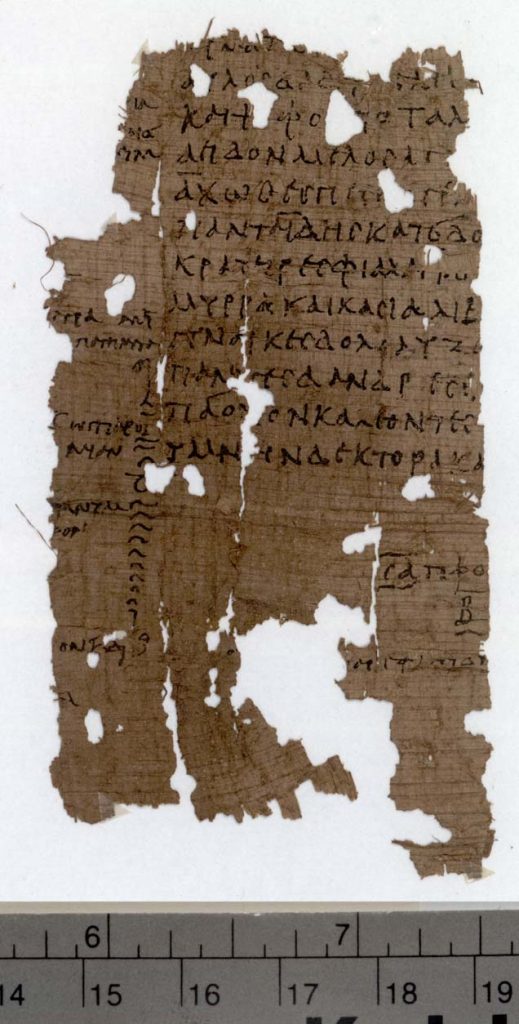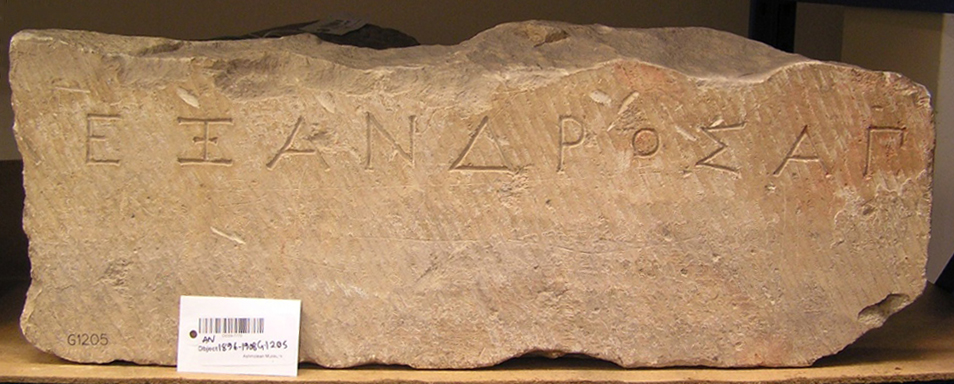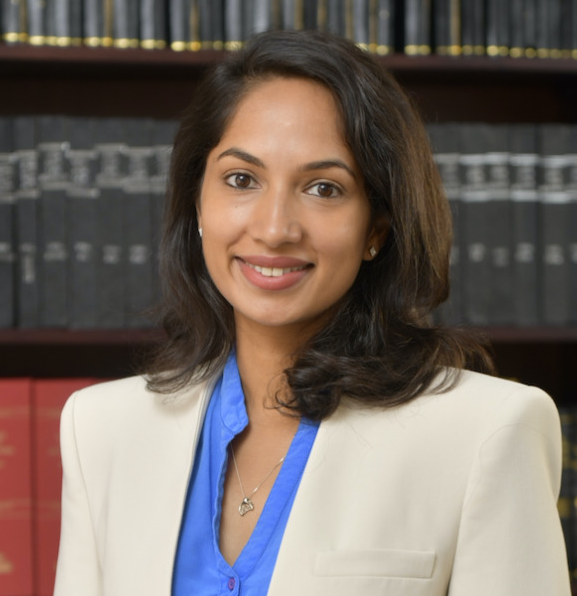Dr Christopher Metcalf, Lobel Fellow in Classics
Classics has a long history at Queen’s, and a distinctive profile. Ancient Greek and Latin formed a central part of the College since its foundation in 1340, for the simple reason that, before 1800, everyone would have done some sort of classical study, not least of Greek for the reading of the Bible. Classics continues to flourish at the College today, and has over time developed certain coherent and characteristic features: these include a special focus on the earliest Greek poets (such as Homer and Sappho); expertise in editing newly discovered primary sources (papyrology, epigraphy); and an interest in studying Greece and Rome in the context of the wider ancient world, particularly the ancient Near East and Egypt.
These characteristics can be traced as far back as the end of the 19th and the beginning of the 20th century. This was the time of what has been described as ‘surely the most successful partnership in the history of classical scholarship’, that between Bernard Grenfell (BA 1892; Fellow 1894-1926), ‘the greatest name in British papyrology’, and Arthur Hunt (BA 1893; Fellow 1906-1934). They discovered an immense cache of papyri in a rubbish-dump of the central Egyptian city of Oxyrhynchus (‘The City of the Sharp-nosed Fish’), which gave up a wealth of Greek literary and documentary texts, many of them new, reused for various purposes and then thrown away: with this discovery, the face of classical scholarship changed forever. A great deal of the Oxyrhynchus material was then edited at the College by another Titan of Classical scholarship, Edgar Lobel (Fellow 1914-1982). An unmatched knowledge of Greek and an extremely sharp eye allowed him to produce judicious, unspeculative and authoritative texts of an enormous range of authors, not least the lyric poets such as Sappho and Alcaeus; these remain fundamental models for papyrological work.

A papyrus fragment from Oxyrhynchus containing parts of Sappho’s poem on the wedding of the Trojan prince Hector and his bride Andromache (fr. 44), published by A.S. Hunt in 1927. Recent research by Dr Christopher Metcalf has shown that Sappho’s poem was known to the Roman poet Vergil, and that it was used by him as a literary model in composing the famous Dido and Aeneas-episode in the Aeneid. The ancient poets were very careful readers of Classical literature; if we would like to understand their works today, let us try to be the same! © courtesy of the Egypt Exploration Society
Also part of the College at this time was Thomas Allen (BA 1885; Fellow 1890-1950), best known for his herculean efforts on the manuscripts of Homer, which he collated in great numbers and digested into families, whilst also studying in detail the transmission of the text. He published the Oxford Classical Text of the Iliad in 1931 and Oxford classicists use it for examinations to this day. At this time too the College produced a Corpus Professor of Latin in A.C. Clark (BA 1881; Fellow 1882-1913), the editor of Cicero, and a Regius Professor of Greek in Ingram Bywater (BA 1862), another man of deep and patient scholarship whose great work was a monumental commentary on Aristotle’s Poetics. The College’s classicists of this period went on to make important contributions also in other areas. Two stand out. Canon Burnett Streeter (BA 1897; Fellow 1905-37), Dean, Chaplain and Provost, was one of the most distinguished New Testament scholars of his day: he did important and entirely original work on the textual tradition of Synoptic Gospels. Archibald Sayce (BA 1866; Fellow 1870-1933) turned East and became one of the greatest Near Eastern scholars of his time. Sayce began to learn Assyrian, Persian, Arabic, and Sanskrit while still at school; he read Vedic hymns with the great Max Müller as a Fresher, and deciphered cuneiform Ugaritic texts without a bilingual text to help him. He pioneered the serious study of Assyrian, and made significant contributions to the study of Hebrew, Egypt, Ancient Greece and linguistic theory.
The end of the 20th century has also seen a very distinguished group of Fellows leading the way in Classical studies. Fergus Millar (Fellow 1964-76), knighted for his contribution to Classical studies, was a Fellow and eventually Camden Professor, and author of major studies of the crowd and the Emperor at Rome, and more especially of many books on Rome’s relationships with its neighbours, especially in the East. He was succeeded by Alan Bowman (BA 1966), best known for work on the Vindolanda Tablets with their invaluable information about life on Hadrian’s Wall. After a number of failures by others, Bowman and his colleagues’ use of multi-spectral photography solved the problem of decipherment. He set up the Faculty’s Centre for the Study of Ancient Documents, which has major collaborations with the Physics Department and does a great range of imaging work with documents of all kinds. Contemporary with Alan Bowman was John Matthews (Fellow 1976-96), who was one of the pioneers of the study of the later Roman Empire, an area which is now firmly established as a major part of Classical studies. Our current ancient historian, Charles Crowther (Fellow since 2010), is the Assistant Director of the Centre for the Study of Ancient Documents, and specialises in Greek epigraphy, with museum and field projects in Chios and in the Commagene region of south-eastern Turkey. Crowther and Bowman are among the editors of the monumental Corpus of Ptolemaic Inscriptions, which includes not only Greek but also Egyptian (hieroglyphic and Demotic) documents, and whose first volume, on Alexandria and the Delta, was published in 2021.

This beautifully cut limestone inscription was found in excavations at Memphis, Egypt, and then donated to the Ashmolean Museum in 1909, where it was kept in storage and forgotten until its recent rediscovery by Dr Charles Crowther. It is a dedication, quite possibly by Alexander the Great, to Apis, the sacred bull of Memphis. Ancient historians attest that Alexander conspicuously participated in the cult of Apis while he was in Memphis. This stone is therefore a monument to the many interactions between Greece and the wider ancient world, in this case Egypt. © Ashmolean Museum, University of Oxford
Recent and current literary scholarship at the College similarly builds on and develops a tradition that has existed for several generations. Here the College’s recent profile has been marked by Angus Bowie (Fellow since 1981), who began his career with a study of the poetic dialect of Sappho and Alcaeus, and has continued to work on earlier Greek literature, especially Homer, Athenian drama, and Herodotus: his commentaries on Homer and Herodotus in particular remain a vital part of undergraduate teaching. Close textual work continues to be done by Almut Fries, who teaches Greek and Latin at the College and is an expert editor of Greek lyric and drama (Pindar, pseudo-Euripides), and by Christopher Metcalf (Fellow since 2016), whose interests lie in both Classical and ancient Near Eastern languages and literatures: his publications have sought to clarify the links between early Greek poetry and ancient Anatolia and Mesopotamia, and have also included first editions of new literary sources in the Sumerian cuneiform script. Much of current Classical research at the College is now integrated with the Centre for Manuscript and Text Cultures, which the College established in 2018 to bring together scholars working on primary sources in a very wide range of ancient and medieval cultures, from early China to the Mediterranean.
The profile that results from all of this is a distinctive combination of detail—in particular through editorial work on ancient texts—and breadth—which is reflected especially in our work on the wider cultural contexts of ancient Greece and Rome.
Dr Christopher Metcalf is Lobel Fellow in Classics at The Queen’s College, Oxford, and Associate Professor in Classical Languages and Literature at the University of Oxford. His research interests include early Greek poetry and, more broadly, the history of literature and religion in early Greece, Anatolia and Mesopotamia. His latest book is Three Myths of Kingship in Early Greece and the Ancient Near East: The Servant, the Lover, and the Fool (Cambridge UP 2024).


